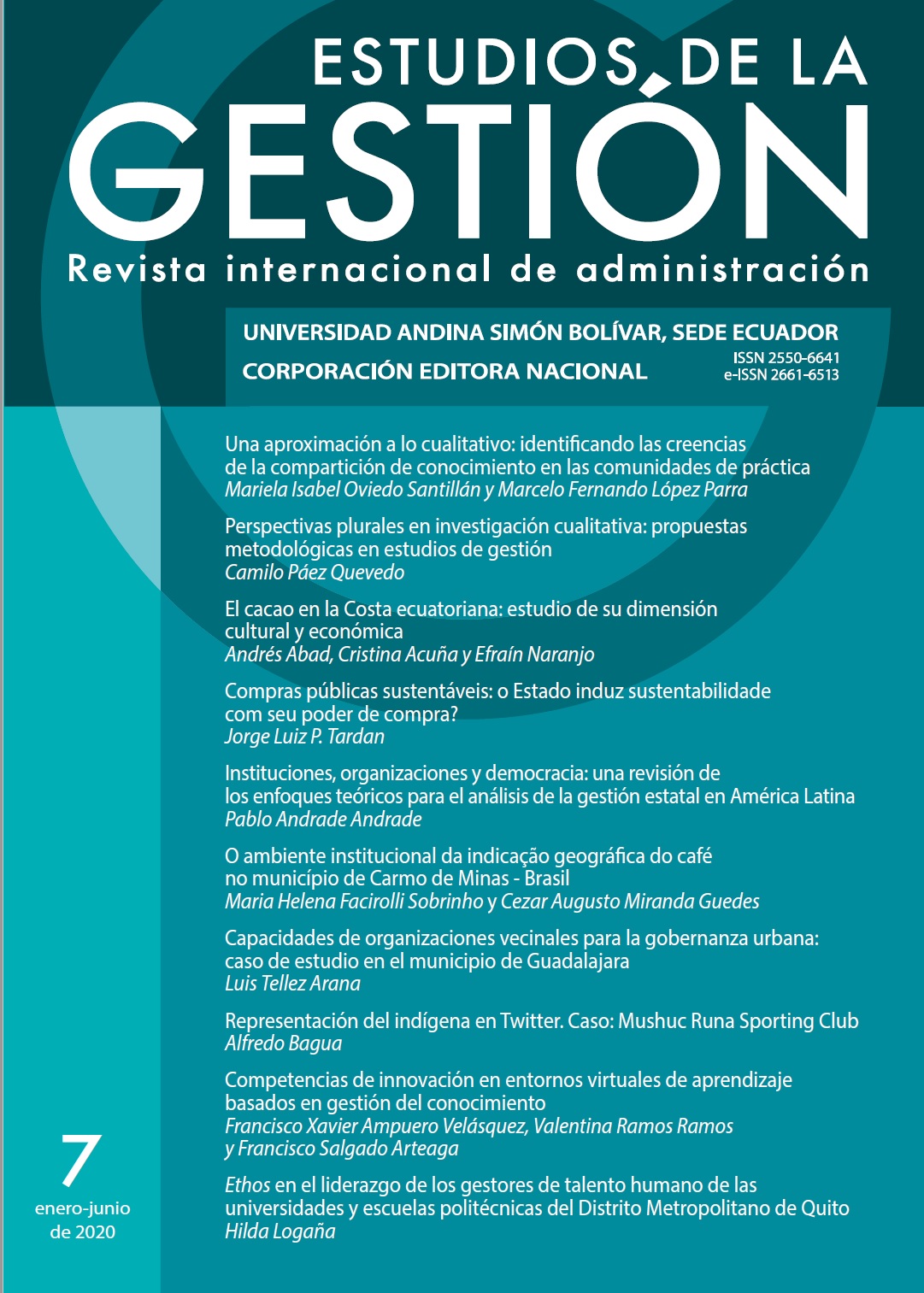Institutions, organizations and democracy: a review of theoretical approaches for the analysis of state management in Latin America
DOI:
https://doi.org/10.32719/25506641.2020.7.4Keywords:
Institutions, policies, organizations, theory, changeAbstract
The article makes a theoretical review of the evolution of the problem of democratic institutions in recent democracies, presenting the standard approaches to study the relationship between political regime and public policy. It is argued that academics have stopped treating democracy from a perspective focused on the components of the political regime to concentrate on the functioning of political institutions in relation to state management. The essay examines three aspects of this new wave of research: mainstream political economy, the approach of informal institutions, and the perspective of political agreements. The review pays particular attention to the place that these three approaches give organizations as political actors. The author concludes by presenting the implications of his theoretical evolution for an empirical research agenda that can be developed from the confluence between political economy and organizational studies.
Downloads
References
Acemoglu, Daron, y Robinson James. 2012. Why Nations Fail: The Origins of Power, Prosperity, and Poverty. Nueva York: Crown.
Altman, David. 2005. “La institucionalización de la ciencia política en Chile y América Latina: una mirada desde el Sur”. Revista de Ciencia Política 25 (1): 3-15. http://dx.doi.org/10.4067/S0718-090X2005000100001
---. 2012. “Where is Knowledge Generated? On the Productivity and Impact of Political Science Departments in Latin America”. European Political Science 11 (1): 71-87. https://bit.ly/2NAqWGM
Andrade, Pablo. 2008. Democracia y cambio político en el Ecuador: liberalismo, política de la cultura y reforma institucional. Quito: Universidad Andina Simón Bolívar, Sede Ecuador / Corporación Editora Nacional.
---. 2015. Política de industrialización selectiva y nuevo modelo de desarrollo. Quito: Universidad Andina Simón Bolívar, Sede Ecuador / Corporación Editora Nacional.
Ang, Yuen Yuen. 2016a. “Beyond Weber: Conceptualizing an Alternative Ideal Type of Bureaucracy in Developing Contexts”. Regulation & Governance 11 (3): 282-298. https://doi.org/10.1111/rego.12123
---. 2016b. How China Escaped the Poverty Trap. Ithaca: Cornell University Press. Basabe, Santiago. 2012. “Judges without Robes and Judicial Voting in Contexts of Institutional Instability: The Case of Ecuador’s Constitutional Court, 1999-2007”. Journal of Latin American Studies 44 (1): 127-161. https://www.jstor.org/stable/41349722
Cameron, Maxwell A. 2018. “The Survival of Defective Democracies”. University of British Columbia. Accedido 20 de mayo de 2019. https://bit.ly/37q4BDp
Carey, John M. 2000. “Parchment, Equilibria, and Institutions”. Comparative Political Studies 33 (6/7): 735-761. https://doi.org/10.1177/001041400003300603
Evans, Peter, y Barbara Stallings. 2016. “Development Studies: Enduring Debates and Possible Trajectories”. Studies in Comparative International Development 51 (1): 1-31. https://doi.org/10.1007/s12116-016-9223-9
Greene, Kenneth. 2009. Why Dominant Parties Lose: Mexico’s Democratization in Comparative Perspective. Nueva York: Cambridge University Press.
Jones, Mark P. 2017. How Much Has the Game Changed? Revisiting Policymaking in Latin America a Decade Later. Washington D. C.: IDB.
Kahn, Mushtaq H. 2010. “Political Settlements and the Governance of Growth-Enhancing Institutions”. SOAS University of London. Accedido 11 de septiembre de 2019. http://eprints.soas.ac.uk/id/eprint/9968
---. 2018. “Political Settlements and the Analysis of Institutions”. African Affairs 117 (469): 636-655. https://doi.org/10.1093/afraf/adx044
Kay, Cristóbal. 1991. “Teorías latinoamericanas del desarrollo”. Nueva Sociedad 113: 101-113. https://bit.ly/2NDcEVT
Korpi, Walter. 1985. “Power Resources Approach vs. Action and Conflict: On Causal and Intentional Explanations in the Study of Power”. Sociological Theory 3 (2): 31-45. https://doi.org/10.2307/202223
Leftwich, Adrian, y Steve Hogg. 2007. “The Case for Leadership and the Primacy of Politics in Building Effective States, Institutions and Governance for Sustainable Growth and Social Development”. Wageningen University & Research. Accedido 2 de septiembre de
Levitsky, Steven, y María Victoria Murillo. 2009. “Variation in Institutional Strength”. Annual Review of Political Science 12 (1): 115-133. https://doi.org/10.1146/annurev.polisci.11.091106.121756
Luna, Juan Pablo. 2014. Segmented Representation: Political Party Strategies in Unequal Democracies. Oxford: Oxford University Press.
Mazzucato, Mariana. 2018. The Value of Everything: Making and Taking in the Global Economy. Nueva York: Hachette Book Group.
Pierson, Paul. 2004. Politics in Time: History, Institutions, and Social Analysis. Princeton: Princeton University Press.
Polga-Hecimovich, John, y Francisco Sánchez. 2018. “The Tools of Institutional Change under Post-Neoliberalism: Rafael Correa’s Ecuador”. Journal of Latin American Studies 51 (2): 379-408. https://doi.org/10.1017/S0022216X1800072X
Rodrik, Dani. 2007. One Economics, Many Recipes: Globalization, Institutions, and Economic Growth. Princeton: Princeton University Press.
Rueschmeyer, Dietrich. 2009. Usable Theory: Analytic Tools for Social and Political Research. Princeton: Princeton University Press.
Schneider, Ben-Ross. 2004. Business Politics and the State in Twentieth-Century Latin America. Cambridge: Cambridge University Press.
---. 2013. Hierarchical Capitalism in Latin America. Business, Labor, and the Challenges of Equitable Development. Nueva York: Cambridge University Press.
Sen, Kunal. 2015. “The Political Determinants of Economic Growth: An Analytical Review”. En The Politics of Inclusive Development, editado por Sam Hickey, Kunal Sen y Badru Bukenya, 35-59. Oxford: Oxford University Press.
Silva, Eduardo. 2009. Challenging Neoliberalism in Latin America. Nueva York: Cambridge University Press.
---, y Federico Rossi. 2018. From Resistance to Neoliberalism to the Second Wave of Incorporation: Comparative Perspectives on Reshaping the Political Arena. Pittsburgh: University of Pittsburgh Press.
Soifer, Hillel, y Matthias vom Hau. 2008. “Unpacking the Strength of the State: The Utility of State Infraestructural Power”. Studies in Comparative International Development, 43 (3-4): 219-230. 10.1007/s12116-008-9030-z
Spiller, Pablo, Eduardo Stein y Mariano Tommasi. 2006. “Political Institutions, Policymaking, and Policy: An Introduction”. En Policymaking in Latin America. How Politics Shapes Policies, editado por Pablo Spiller, Mariano Tommasi, Ernesto Stein y Carlos Scartascini,
-27. Washington D. C.: IBD.
Thelen, Kathleen, y James Mahoney. 2010. “A Theory of Gradual Institutional Change”. En Explaining Institutional Change: Ambiguity, Agency and Power, editado por James Mahoney y Kathleen Thelen, 1-36. Nueva York: Cambridge University Press.
Thorp, Rosemary. 1998. Progress, Poverty, and Exclusion. An Economic History of Latin America in the 20th Century. Washington D. C.: IDB.
Zibblat, Daniel. 2006. “How Did Europe Democratize?”. World Politics 58 (2): 311-338. https://doi.org/10.1353/wp.2006.0028












